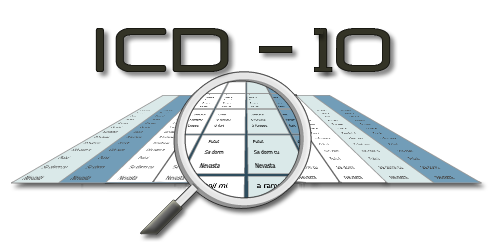Learn ICD-10 Codes for COPD- Chronic Obstructive Pulmonary Disease.
Chronic obstructive Pulmonary Disease (COPD) also commonly known as chronic obstructive lung disease is a disease for the lungs that is persistent with poor air flow as a result of breakdown of the lung tissue and dysfunction of the small airways.
Chronic Obstructive Pulmonary disease is a high burden disease commonly known to cause disability and impairment of life. It is one of the leading causes of chronic morbidity and mortality in the US. Prevention of the disease is highly possible and should always be encouraged even though treatment is also effective.
ICD 10 code j44 is further divided into j44.0, j44.1, j44.9 with each code representing a specific condition of COPD. J44.0 is an ICD 10 code for chronic obstructive pulmonary disease with acute lower respiratory infection and the code are normally used to identify the type of infection.J44.1 on the other hand is an ICD10 code that will be used to represent chronic obstructive pulmonary disease with acute exacerbation, Decompensated COPD and decompensated COPD with acute exacerbation.
ICD 10 code excludes chronic obstructive pulmonary disease with acute bronchitis ICD 10 code J44.9 is a chronic obstructive pulmonary ICD-10 code that will be used to specify Chronic obstructive airway disease NOS and chronic obstructive lung disease NOS.
J44.1 is a specified ICD-10 code that can be used by medical billers and coders to specify a diagnosis for chronic obstructive pulmonary disease.ICD-10-CM codes will officially replace the in use ICD-9-CM as from October 2014, they are currently only used for training and planning purposes.
J45 is an ICD 10 code that designates forms of asthma such as Allergic bronchitis, Atopic asthma, extrinsic allergic asthma, and hay fever with asthma, No allergic asthma. Code J45 is further divided into J45.2 which is used to represent, Mild intermittent asthma, J45.3 Mild persistent asthma, J45.4 Moderate, persistent, J45.4 severe persistent. J45.9 is unique in that it is normally used when specifying unspecified asthma such as Asthmatic bronchitis NOS, Childhood asthma NOS and late Onset asthma.
COPD ICD-10CM code J45 includes new and more specific terms that will essentially be used to improve data quality leading to more effective research and treatments. This code denotes the severity and frequency of a given chronic condition and the presence of status asthmaticus or acute exacerbation.
When reporting ICD-10-CM code J45 for COPD, additional information is usually necessary which can be represented by the following:
Chronic obstructive Pulmonary Disease (COPD) also commonly known as chronic obstructive lung disease is a disease for the lungs that is persistent with poor air flow as a result of breakdown of the lung tissue and dysfunction of the small airways.
Chronic Obstructive Pulmonary disease is a high burden disease commonly known to cause disability and impairment of life. It is one of the leading causes of chronic morbidity and mortality in the US. Prevention of the disease is highly possible and should always be encouraged even though treatment is also effective.
ICD-10 Codes for COPD- Chronic Obstructive Pulmonary Disease
ICD 10 codes j40-j44 will be used to define the various diagnoses of Chronic Obstructive pulmonary disease including all disease entities bronchitis and lung disease. Code j44 will be used for other chronic obstructive pulmonary disease including asthma with chronic, obstructive pulmonary disease, chromic asthmatic obstructive bronchitis, chronic bronchitis with airways obstruction, chronic bronchitis with emphysema and chronic obstructive asthma.ICD 10 code j44 is further divided into j44.0, j44.1, j44.9 with each code representing a specific condition of COPD. J44.0 is an ICD 10 code for chronic obstructive pulmonary disease with acute lower respiratory infection and the code are normally used to identify the type of infection.J44.1 on the other hand is an ICD10 code that will be used to represent chronic obstructive pulmonary disease with acute exacerbation, Decompensated COPD and decompensated COPD with acute exacerbation.
ICD 10 code excludes chronic obstructive pulmonary disease with acute bronchitis ICD 10 code J44.9 is a chronic obstructive pulmonary ICD-10 code that will be used to specify Chronic obstructive airway disease NOS and chronic obstructive lung disease NOS.
J44.1 is a specified ICD-10 code that can be used by medical billers and coders to specify a diagnosis for chronic obstructive pulmonary disease.ICD-10-CM codes will officially replace the in use ICD-9-CM as from October 2014, they are currently only used for training and planning purposes.
J45 is an ICD 10 code that designates forms of asthma such as Allergic bronchitis, Atopic asthma, extrinsic allergic asthma, and hay fever with asthma, No allergic asthma. Code J45 is further divided into J45.2 which is used to represent, Mild intermittent asthma, J45.3 Mild persistent asthma, J45.4 Moderate, persistent, J45.4 severe persistent. J45.9 is unique in that it is normally used when specifying unspecified asthma such as Asthmatic bronchitis NOS, Childhood asthma NOS and late Onset asthma.
COPD ICD-10CM code J45 includes new and more specific terms that will essentially be used to improve data quality leading to more effective research and treatments. This code denotes the severity and frequency of a given chronic condition and the presence of status asthmaticus or acute exacerbation.
When reporting ICD-10-CM code J45 for COPD, additional information is usually necessary which can be represented by the following:
- Exposure to environmental tobacco smoke (Z77.22)
- Exposure to tobacco smoke in the prenatal period (P96.81)
- History of tobacco use (Z87.891)
- Occupational exposure to environmental tobacco smoke (Z57.31)
- Tobacco dependence (F17-)
- Tobacco use (Z72.0)


Post a Comment
Webmaster reserves the rights to edit/remove comments that is found irrelevant, offensive, contain profanity, serves as spam or attempts to harbor irrelevant links. Please read our Comments Policy for details.
Click to see the code!
To insert emoticon you must added at least one space before the code.